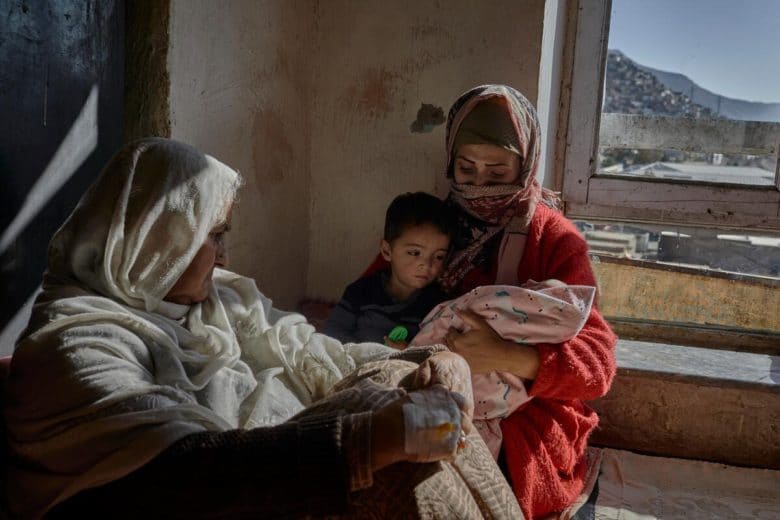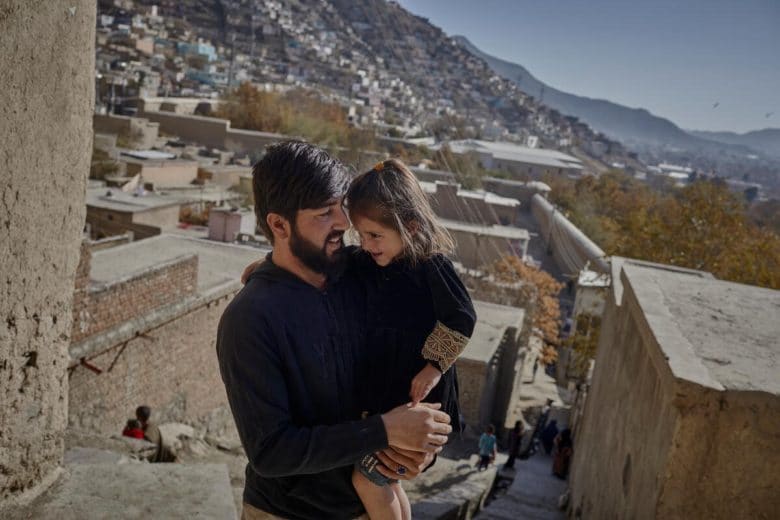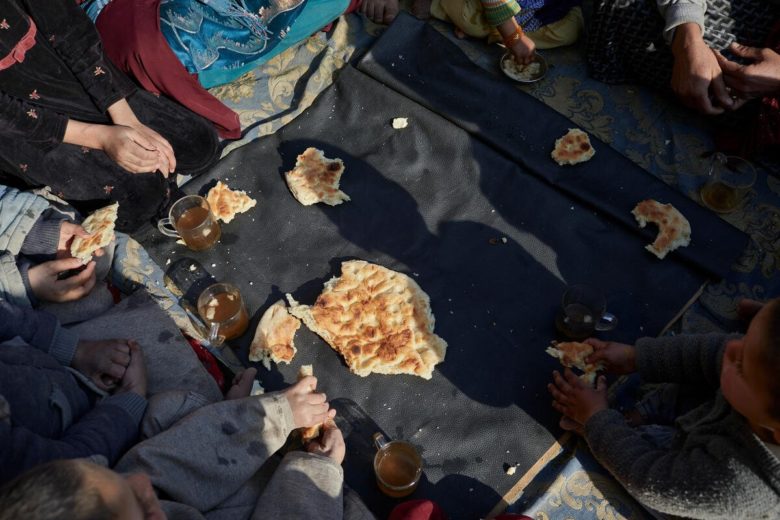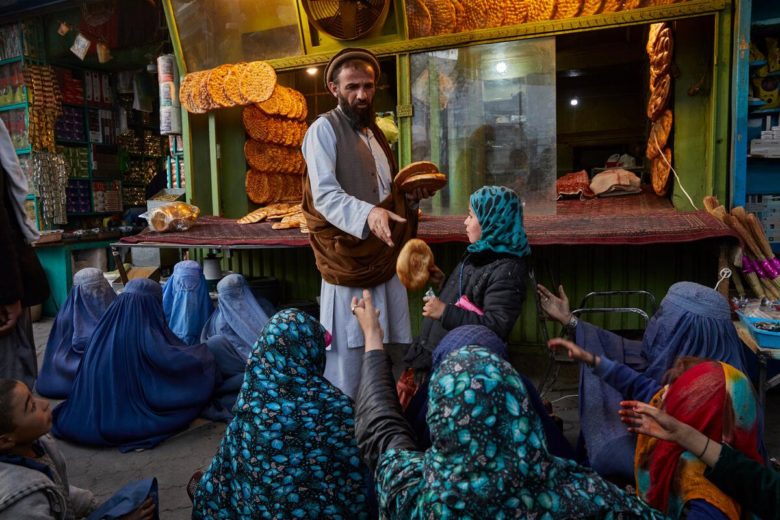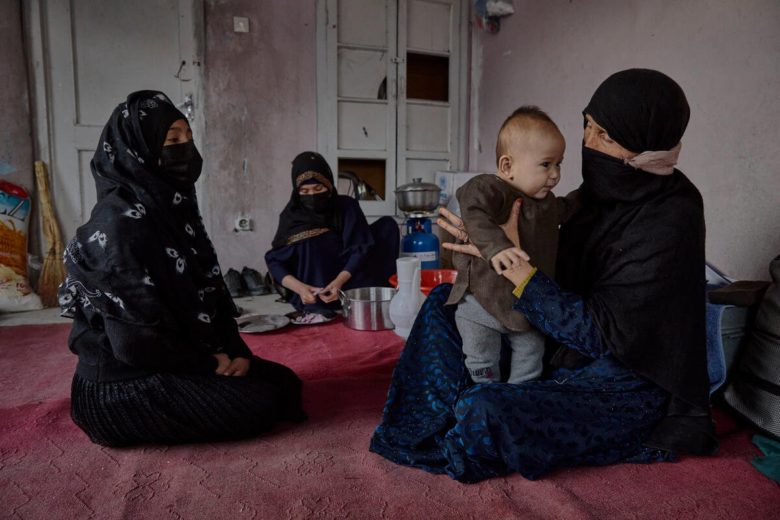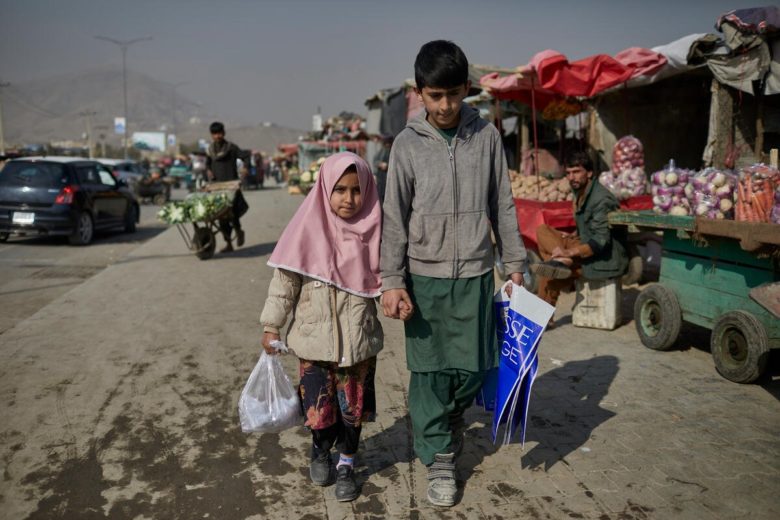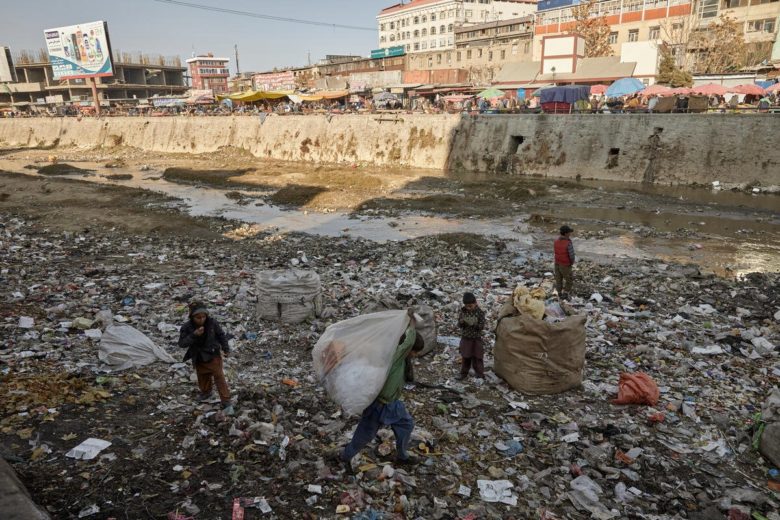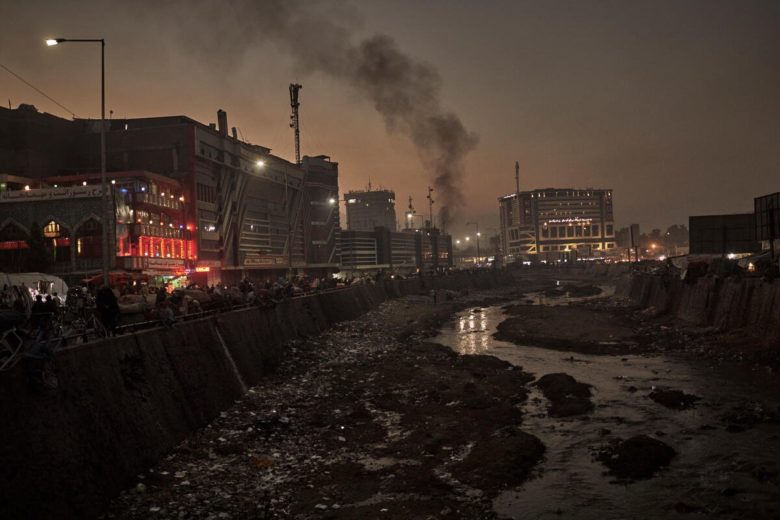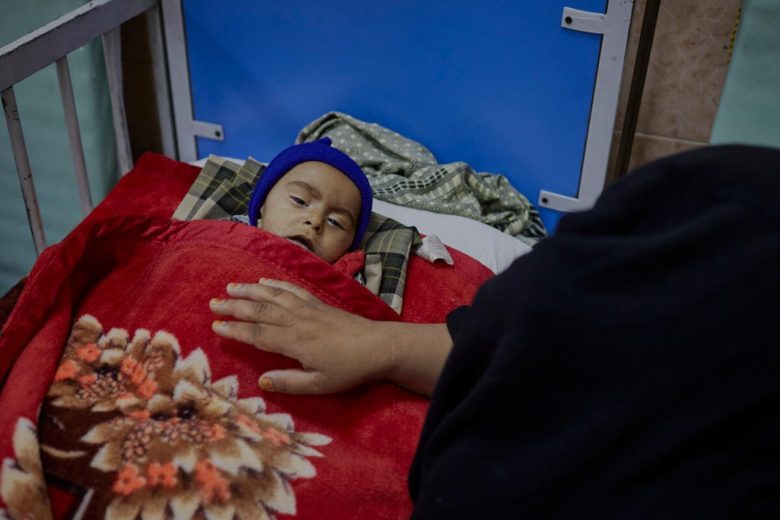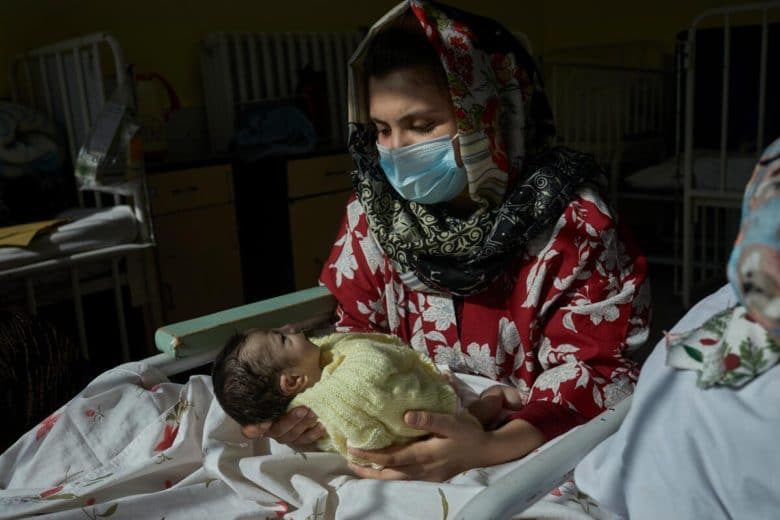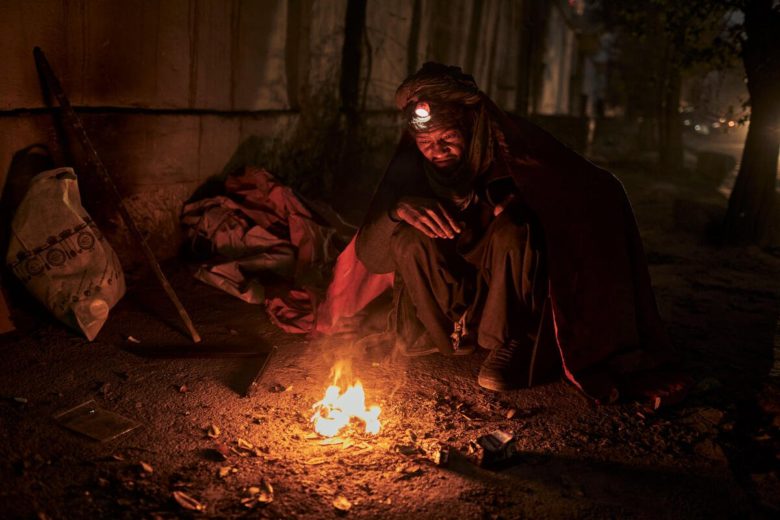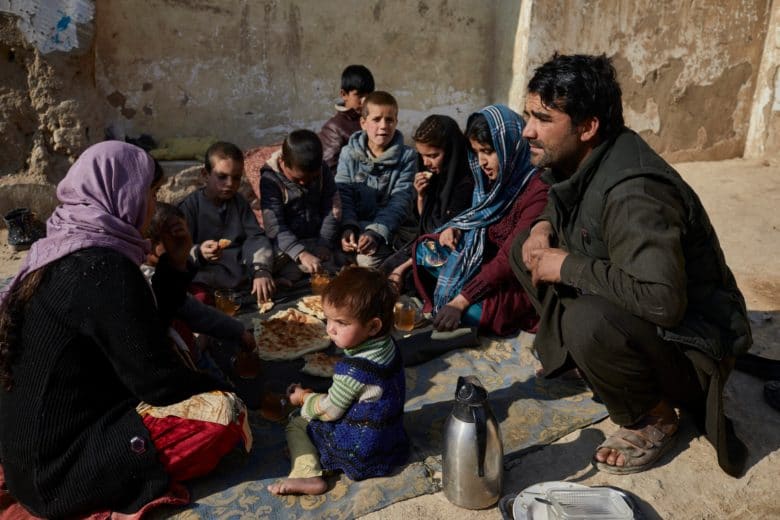
Ibrar Hussain* and his family share a meal of bread at their temporary home on the outskirts of Kabul. They fled their home in the northern city of Kunduz when it was destroyed by fighting in May 2021.
Displaced Afghans facing “humanitarian catastrophe” this winter.
Photography by Andrew McConnell
Afghanistan was facing a convergence of crises even before the Taliban took power in August. A severe drought was withering crops, the socio-economic impacts of the COVID-19 pandemic had increased poverty and the country’s long-running conflict had left over 3 million Afghans internally displaced.
Now, Afghanistan is on the brink of what the UN Special Representative Deborah Lyons has described as “a humanitarian catastrophe”. The effects of an imploding economy are being felt across society, but those already forced from their homes by the conflict are particularly vulnerable.
Of some 668,000 Afghans displaced by fighting since the start of this year, some 50,000 fled to Kabul, the capital.
The city is located at an altitude of 1,800 metres and during winter temperatures here often dip to well below 0° Celsius at night. While some have returned to their home areas in recent weeks, others remain fearful or have no homes to return to.
Many will spend the cold winter months in makeshift shelters or crammed into unheated rented rooms, wondering how they will afford their next meal.
Safa, and her mother-in-law, Bibi Khatoon, are part of a family of eight who were caught up in fighting between the Taliban and former government forces in north-eastern Afghanistan three months ago.
The family arrived in Kabul with nothing but were able to rent this room outside the city after receiving cash assistance from UNHCR, the UN Refugee Agency. Safa gave birth to her baby 40 days ago.
Safa’s husband, Abdul Sattar, holds their 4-year-old daughter outside their room in Kabul. “At this moment, we are too scared to return home, and also, we have no home to go to,” he says, describing how a rocket hit their house in north-eastern Afghanistan “and everything turned to dust”.
“We are too scared to return home, and also, we have no home to go to.”
“There is no one left in the area, everyone fled,” he adds. “My parents are traumatized and still haven’t come out of the shock.”
A displaced family of nine share a piece of bread for their midday meal. A combination of international sanctions, the freezing of Afghan government assets and the suspension of foreign aid has plunged Afghanistan into an economic crisis.
The drought and resulting poor harvest have worsened the situation, with food stocks predicted to run out by mid-winter. Soaring unemployment and food costs have pushed 22.8 million people, over half the country’s population of 40 million, into hunger.
Women and children, some of them displaced to Kabul by the conflict, beg for bread outside a bakery.
The economic crisis has pushed many Afghans who were already living hand-to-mouth into extreme poverty and the number of Kabul residents begging on the streets is rising by the day.
Zarina holds her six-month-old baby, Asad, in the room she has been renting in Kabul for herself and her three children, since her husband was killed in July. She found work in the local market cleaning kidney beans, but it is not enough to support her family.
“My children are half fed and half hungry”
“My children are half fed and half hungry,” she says. “We eat rice and bread.” With the cash assistance she received from UNHCR, she was able to pay what she owed to a shopkeeper. “If I hadn’t been able to pay the loan, I might have had to sell my baby.”
Ten-year-old Matiullah, and his eight-year-old sister, Hajira, sell plastic bags in the market near their home to help their mother and older sister. The family moved to Kabul six months ago after their home in the northern city of Kunduz was destroyed by fighting.
“I would love to go back [to school] if we had a better life.”
On a good day, they sell about 10 plastic bags. “I left school about four years ago,” says Matiullah. “I would love to go back if we had a better life.”
Children collect plastic from the banks of the Kabul River.
Over 4 million children in Afghanistan are now out of school and the dire economic situation is pushing more families to send their children out to work.
Reports of child marriage are also on the rise, according to UNICEF.
The Kabul River, which runs through the heart of the city, is suffering from low water and heavy pollution.
The drought, which hit large swathes of the country at the beginning of the year, has contributed to falling river and groundwater levels in Kabul. A second year of La Niña weather patterns is expected to cause the drought to continue this winter.
Eight-month-old Barkatullah, who is suffering from malnutrition, is comforted by his mother at Indira Gandhi Children’s Hospital in Kabul.
According to UNICEF, around 3.2 million Afghan children under five are acutely malnourished and 1.1 million are at risk of dying from severe, acute malnutrition without treatment.
At Kabul’s Ataturk Children’s Hospital, Najiba, 22, holds her son Roshan, who is 43-days-old and suffering from malnutrition.
Many mothers are struggling to breastfeed because they themselves are undernourished.
Winter is expected to bring further hardships for Afghans, particularly those who are displaced and whose resilience has been stretched to breaking point. UNHCR is scaling up assistance to help displaced families cope with the harsh conditions, but more humanitarian aid is needed.
“Urgent support is needed to help the most vulnerable Afghans survive during the winter months and keep their families safe and warm.”
Subscribe to UNHCR’s mailing list
“Without critical in-kind and cash support, communities will be exposed to extreme shocks including loss of life,” warned UNHCR’s representative in Afghanistan, Caroline van Buren. “Urgent support is needed to help the most vulnerable Afghans survive during the winter months and keep their families safe and warm.”
*All names have been changed for protection purposes.
Originally published by UNHCR on 02 December 2021.



